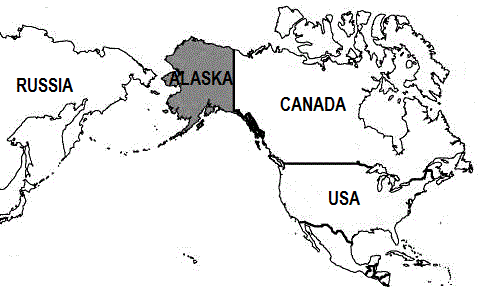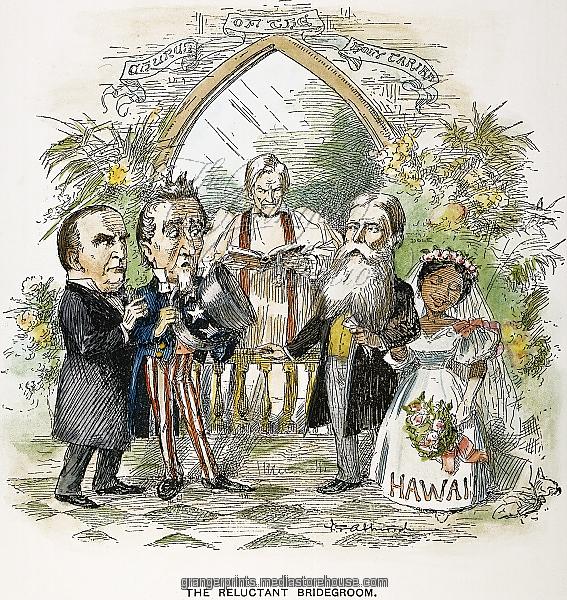Why was acquiring Alaska & Hawaii beneficial to the U.S.?
1 Answer
United States acquisition of Hawaii enabled the American Navy to access Hawaii's naval base, Pearl Harbor.
Acquisition of Alaska enabled the United States to expand, find valuable resources and become more of a world power.
Explanation:
Acquisition of Alaska Explained
Having had an envision of an American empire that included Canada, Cuba, Central America, Hawaii, Iceland and Greenland, Secretary of State William Seward became a key figure in the acquisition of Alaska. For instance, William Seward was a supporter of territorial expansion, and being Secretary of State allowed him to be able to advocate and push forward action for the purchase of Alaska (which at that time was known as Russian America).

To add on, prior to the ratification of the Treaty of Cession in 1867 (which officially declared Alaska as property of the United States), Russia was the nation in control of Alaska. However, it soon became evident that the purchase of Alaska by the United States wouldn’t only benefit the United States alone, but also Russia (as this would assist with the economic problems Russia was facing at the time).
For instance, Russia agreed to the Alaska Purchase because it was experiencing economic problems (which came about as Russia was weakened during the Crimean War in 1856). To add on, because of it’s current condition, Russia soon feared that Russian America (Alaska) would be an easy target for the increasing British settlers along that area (who didn’t have an amicable relationship with Russia as they battled and defeated Russia in the Crimean War).
Therefore, Russia offered to sell Alaska to the United States in 1859, believing that the United States would offset the designs of Russia’s greatest rival in the Pacific, Great Britain. This case was presented as U.S Secretary of State William Seward met in Washington with the Russian minister (Eduard De Stoeckl), where they negotiated the ratification of the Alaska Purchase (made on March 30th, 1867 where it was decided that the United States would buy Alaska for $7.2).
Later on the Senate approved this treaty and so did President Andrew Johnson, making Alaska the 49th state of the United States. Thus, this was beneficial for the United States as Alaska was acquired through diplomatic means.

Acquisition of Hawaii Explained
Basically, Queen Liliuokalani was Hawaii's monarch until the United States decided to annex Hawaii. For instance, as the end of the 19th century approached, the importance of naval power became evident as the United States was undergoing an era of Imperialism (which was greatly led by Captain Alfred T. Mahan).
To add on, American intervention in Hawaii had long existed (with missionaries and whalers visiting the island intermittently). However, as American interests in Hawaii grew- with the American desire for naval bases, territorial expansion, and the need to maintain a position in the international race for power- the United States annexed the Hawaiian Islands.
Moreover, as previously mentioned, by acquiring Hawaii, the United States was able to become more of a world power (there were many beneficial outcomes that stood to profit from the acquisition of Hawaii and that is why the United States was propelled into annexing it before any other European power did), and that is why Hawaii is part of the United States today, making it the 5oth state.

Extra Fun Facts to Know!
- Some people actually disapproved of the Alaska purchase and therefore, many referred to it as Seward’s Folly or Seward’s Icebox and even Andrew Johnson’s Polar Bear Garden
#-># what they were basically trying to say was that the United States had just spend such a grand amount of money for an area that didn’t have much to offer (that wasn’t really worth the cost). - On the contrary, some believed that Alaska actually had potential resources to offer as gold was later on discovered there in 1880 by Joe Juneau, which led to the Juneau Gold Rush
- Special legislation extends the provisions of the Homestead Act of 1862 to the territory of Alaska allowing adventurous pioneers in the state to stake a claim for 160 acres of public land for development as a homestead.
- Alaska was recognized in World War Two as it’s strategic importance would account for what many believed was a waste in the United States investments.
 )
)

